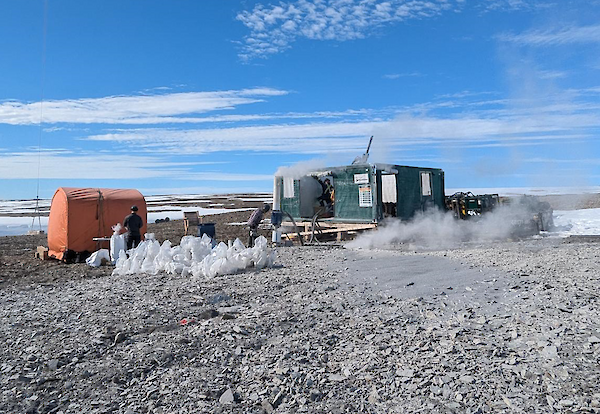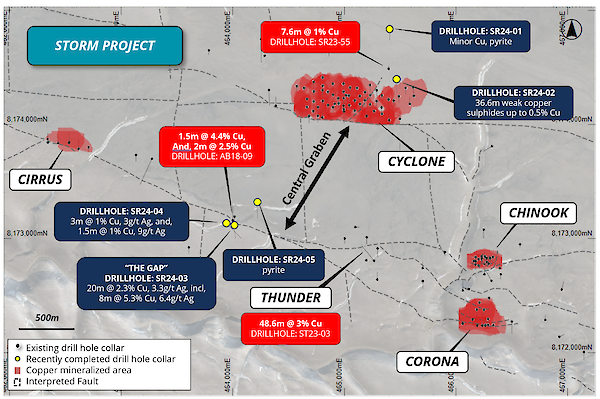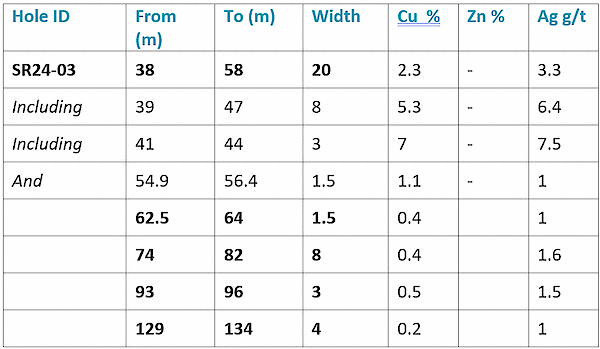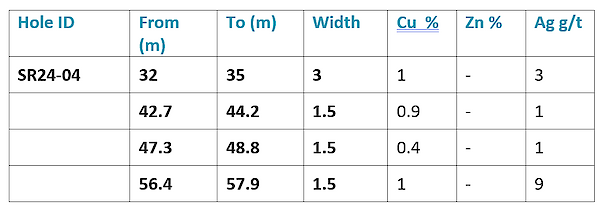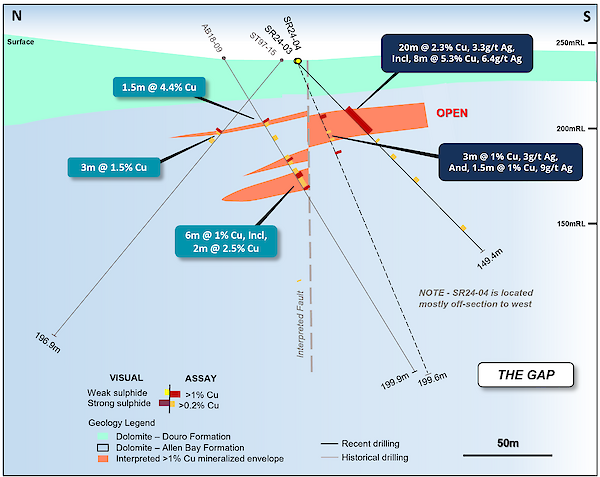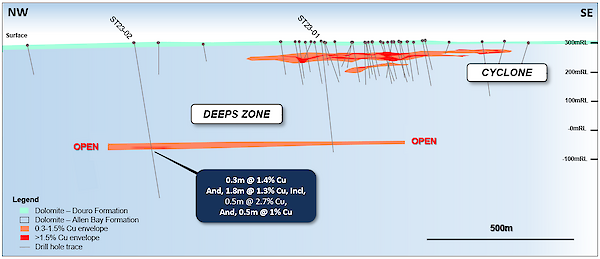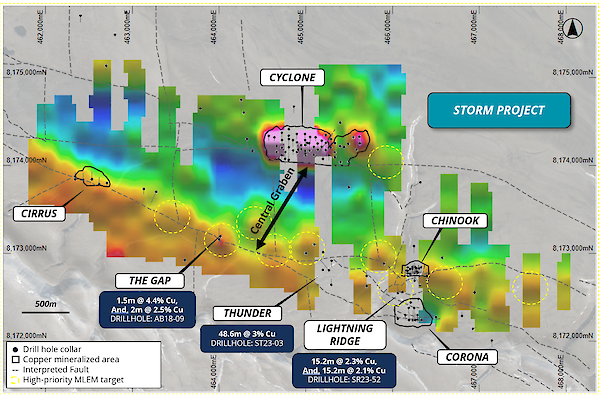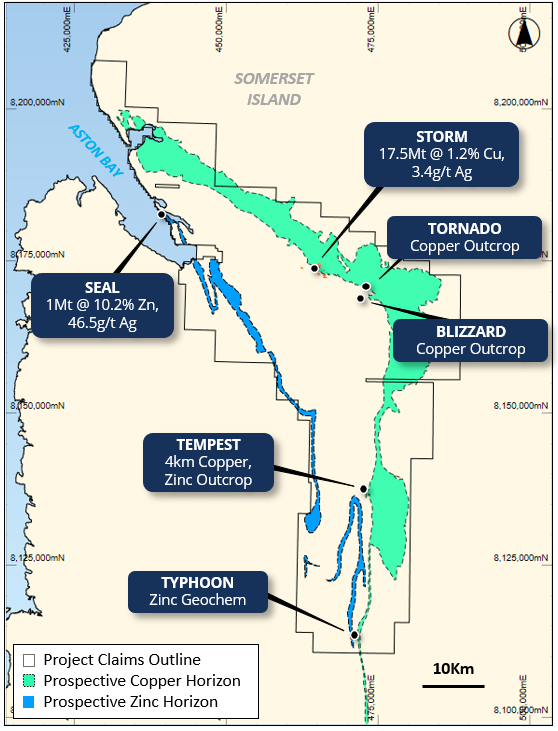News
Aston Bay and American West Metals Confirm New Zone of Thick, Near-Surface, High-Grade Copper at Storm Copper Project, Canada
Grades of more than 7% copper in recent drilling of The Gap;
planned 20,000m summer drilling program underway
- Drill hole SR24-03 at the underexplored Gap prospect has intersected:
- 20 metres (“m”) @ 2.3% copper (“Cu”) from 38m downhole, including,
- 8m @ 5.3% Cu from 39m downhole, including,
- 3m @ 7% Cu from 41m downhole
- 8m @ 5.3% Cu from 39m downhole, including,
- 20 metres (“m”) @ 2.3% copper (“Cu”) from 38m downhole, including,
- SR24-03 was drilled to test an electromagnetic (EM) anomaly, once again demonstrating the strong correlation between EM targets and very high-grade copper sulfide mineralization
- A further 10 EM anomalies have already been identified by the 2024 EM program, with deep penetrating, high-resolution EM surveys planned to recommence this month around the existing Storm deposits as well as the regional Tornado, Blizzard, and Tempest areas
- The summer drilling program is now underway with approximately 20,000m of drilling planned, initially using two Reverse Circulation (RC) rigs and one diamond drilling rig, to target:
- Resource definition at the Thunder high-grade discovery where drilling during 2023 intersected 48.6m @ 3% Cu from 32.4m (ST23-03)
- Resource definition and extension at the Cyclone and Chinook Prospects
- Shallow, high-priority EM targets within the Storm area
- Large-scale geophysical targets below the Cyclone Prospect where drilling during 2023 discovered high-grade copper sulfides up to 2.7% Cu at approximately 300m vertical depth (ST23-02)
- Bulk sampling for prefeasibility and development studies
- Sealift to Storm locked-in for September 2024 with fuel and other drilling supplies as well as heavy mechanized equipment for the 2025 season already delivered to port in Montreal and ready for shipping to Storm
TORONTO, Ontario, July 2, 2024 – Aston Bay Holdings Ltd. (TSXV: BAY) (OTCQB: ATBHF) ("Aston Bay" or the "Company”) is pleased to present an update on drilling and exploration activities currently underway at the Storm Copper Project (“Storm” or the “Project”) on Somerset Island, Nunavut. The program is being conducted by American West Metals Limited (“American West”), who is the operator of the Project. Aston Bay and American West have formed a 20/80 unincorporated joint venture in respect of the Storm Project property, with Aston Bay maintaining a free carried interest until a decision to mine upon completion of a bankable feasibility study.
Thomas Ullrich, Chief Executive Officer of Aston Bay, commented:
“The 2024 exploration program is already delivering early exploration success this season. The grade and length of this intercept at the new Gap Prospect are impressive, further proof of the effectiveness of EM geophysics as a targeting tool for copper.
“The track-mounted RC drill rig, new to Storm this year, will improve efficiency in delineation drilling, augmenting our heli-portable RC and diamond rigs. Multiple anomalies remain untested - we are just getting started, with more geophysics and 20,000 metres of reverse circulation (RC) and diamond drilling planned for the rest of the season.”
Figure 1: Reverse Circulation (RC) drilling underway at the Chinook Prospect, Storm Project, Nunavut.
SUMMER DRILLING TO ACCELERATE AND BUILD ON EARLY 2024 SUCCESS
Assays from the spring program drill holes SR24-01, SR24-02, SR24-03, SR24-04 and SR24-05 have now been received and confirm new exploration success in The Gap area, which is located midway between the Cirrus Prospect and the high-grade Thunder Prospect.
A total of five drill holes for 992.2m were completed during the spring program before the break leading into the summer drilling and exploration program.
The drilling at The Gap has intersected a thick interval of high-grade copper sulfides associated with an EM anomaly. The intersection of 20m @ 2.3% Cu from 38m downhole contains copper grades up to 7.3% Cu (from 41m downhole) and continues to confirm the association of EM anomalies with very high-grade, semi-massive copper sulfides.
The Gap EM anomaly was the first of a series of high-priority conductors in the southern graben area that are planned to be tested during the drilling season. The drill hole highlights the potential for further discoveries along the 4km of structures that host the Cirrus and Corona Prospects, as well as the high-grade Thunder (48.6m @ 3% Cu) and Lightning Ridge (30.4m @ 2.1% Cu) copper prospects.
The fifth drill hole of the spring program (SR24-05) tested a historic Induced Polarization (IP) geophysical anomaly within the central graben area, an area with very little previous drilling. This central graben area is interpreted to be a down-dropped block between the two main faults to the north and south that host or are spatially associated with most of the copper mineralization at Storm. The geology in the graben is considered equally prospective as elsewhere at Storm but displaced downwards an unknown depth.
This fifth hole encountered a thick sequence of pyrite mineralization, typical peripheral-style mineralization at Storm, and the likely source of the IP anomaly. The hole terminated at 251.5m, the limit of the RC drill rig, without intercepting copper sulfides. This suggests that the hypothesized flat-lying copper-mineralized horizon within the central graben could be displaced 250m stratigraphically below the mineralized zones as seen at Cyclone. Additional drilling with the diamond drill rig will test Fixed Loop Electromagnetic (FLEM) and Moving Loop Electromagnetic (MLEM) anomalies in this highly prospective area.
The Summer program has now commenced testing a broad range of exploration and resource targets, including the Thunder, Cyclone and Chinook Prospect areas. The program will initially use two RC rigs and one diamond drilling rig with over 20,000m of drilling planned for the 2024 program.
Table 1: Details for the 2024 resource and exploration drill holes completed to date.
Figure 2: Recent and existing drill hole locations and zones of copper mineralization overlaying aerial photography.
DRILL HOLE SR24-02 DETAILS
SR24-02 was drilled to the north of the Cyclone Prospect to a downhole depth of 140.2m and was designed to test for potential extensions to the existing copper resources at the Cyclone Prospect.
SR24-02 intersected a single thick zone of copper sulfide mineralization between 82m and 116m downhole. The chalcocite dominant, weakly mineralized zone consists of thin veinlets and patchy disseminations within fractured dolomite, with grades up to 0.5% Cu (82.3 – 83.8m downhole).
The relatively lower grades of the interval reflect other nearby drill holes that are characterized by a local facies change in the rock to massive dolomudstone: the “tight” very fine-grained mudstone rock lacks the open space necessary for the efficient copper mineralization that is well-defined laterally throughout Cyclone. Importantly, however, previous drilling has confirmed that the copper mineralization re-intensifies in more favourable permeable host rock to the east, as well as potentially north towards drill hole SR23-55 (7.6m @ 1% Cu, including 1.5m @ 2% Cu), providing vectors for future drilling.
Table 2: Summary of significant drilling intersections for drill hole SR24-02 (>0.2% Cu)
DRILL HOLE SR24-03 & SR24-04 DETAILS
SR24-03 was drilled to a downhole depth of 149.4m and was designed to test a strongly conductive MLEM anomaly in The Gap area (midway between the Cirrus copper prospect and the Thunder high-grade copper prospect) (Figure 2).
The entire 149.4m length of drill hole SR24-03 is variably mineralized with a combined total of 47.2m of breccia and vein-style copper mineralization. The drill hole contains a strongly sulfide-mineralized breccia interval which returned 20m @ 2.3% Cu from 38m downhole. The mineralization within the strongly mineralized zone (chalcocite, bornite, chalcopyrite) appears very similar to that of the Thunder Prospect to the east and contains a semi-massive sulfide zone grading 8m @ 5.3% Cu from 40m downhole.
Table 3: Summary of significant drilling intersections for drill hole SR24-03 (>0.2% Cu)
SR24-04 was drilled to a downhole depth of 199.6m and was designed to help determine the geometry of the main zone of copper mineralization encountered in drill hole SR24-03 for future resource definition drilling. The drill hole was drilled across section and below SR24-03.
SR24-04 intersected a number of copper zones with vein-style mineralization hosted within fractured dolomite.
Table 4: Summary of significant drilling intersections for drill hole SR24-04 (>0.2% Cu)
The intersection depths and the intensity and zoning of copper sulfides in both drill holes indicate that the mineralization in the Gap area may be relatively flat-lying and may have the potential for lateral expansion (Figure 3).
The Gap exploration holes were planned to test a very strong MLEM anomaly that covers an area of approximately 300m x 200m. This feature is located within a much larger zone of moderately conductive EM, which suggests that the footprint of copper mineralization in The Gap area could be significant.
Additional drilling will be used to determine the extent of the copper mineralization at The Gap Prospect during the 2024 summer drilling season.
Figure 3: N-S schematic geological interpretation on section 464,000E showing the location of SR24-03 and SR24-04. Note – drill hole SR24-04 is located off section and shown for context.
DRILL HOLE SR24-05 DETAILS
Exploration drill hole SR24-05 was drilled to 251.5m and was designed to both test an IP anomaly and investigate the stratigraphic section within the central graben area of Storm.
The interpretation of historical IP data highlighted a broad, weakly chargeable feature that may have represented disseminated copper sulfides.
This central graben area is interpreted to be a down-dropped block between the two main faults to the north and south that host or are spatially associated with most of the copper mineralization at Storm. The geology in the graben is thought to be equally prospective as elsewhere at Storm but displaced downwards by faulting, suggesting that any mineralized horizons in the large graben, if present, would also be displaced downward an unknown depth.
SR24-05 encountered a thick sequence of pyrite mineralization, the typical peripheral-style mineralization at Storm, between 58m and 204m and is the likely source of the IP anomaly. The drill hole did not intersect the hypothesized copper horizon which is interpreted to be displaced below 250m vertical depth.
Deeper diamond drilling will test the prospective copper horizon (which also hosts the Cyclone copper deposit) at depth in the central graben area. Deep diamond drilling during 2023 intersected copper sulfide mineralization up to 2.7% Cu (from 358.2m downhole in drill hole ST23-02), confirming the potential for a stacked mineral system in the Storm area, with at least two highly prospective horizons identified to date (at depths of 50-100m and 250-350m depth respectively).
RESOURCE DEFINITION DRILLING PLAN – THUNDER, CYCLONE AND CHINOOK PROSPECTS
The near-surface, favourable geometry and high copper grades of the Storm prospects have set the foundation for what Aston Bay and American West believe could be a large-scale, long-life copper mining camp in the Storm area.
The Thunder Prospect, as well as the Cyclone and Chinook Prospects have been prioritized for the delineation of resources for the maiden resource estimate at Storm. Work at Cyclone and Chinook will also aim to convert a large volume of mineralized rock.
The copper mineralization within all of these prospects remains open with numerous high-grade copper drill intervals on the margins of the deposits. An estimated 12,000 – 15,000m of drilling has been planned for resource expansion activities in the Storm area.
EXPLORATION DRILLING PLAN
The recent exploration and resource definition activities indicate that the Storm Prospects and extensive copper mineralization are only a small part of a very large, sediment-hosted copper mineral system.
Significant exploration discovery potential along strike and at depth
There is significant potential for additional exploration discovery at Storm both at depth and along strike. High-grade copper sulfide mineralization has been found at a stratigraphic level below the known near-surface copper prospects (Figure 4), and at numerous other locations along the 100km strike of the prospective copper horizon (Figure 6).
All five of the deep diamond drill holes completed during the 2022 and 2023 programs intersected copper sulfide mineralization at approximately the same stratigraphic horizon (270-320m vertical depth) across an of area of 5 km2. Notably, drill hole ST23-02 intersected high-grade mineralization up to 2.7% Cu (at 358.2m downhole), and multiple intersections over 1% copper, indicating the potential of the system to host economic mineralization similar to that defined in the near surface at that deeper stratigraphic level (Figure 5).
Figure 4: Long Section view of the Cyclone Prospect showing the known copper mineralization, drilling, and the potentially extensive copper horizon intersected at depth by diamond drilling in 2022/2023.
MLEM highly effective, now optimized for both near-surface and >250m depth
Phase 1 of the Moving Loop Electromagnetic (MLEM) survey was completed during the Spring exploration program. The survey covered the majority of central graben of the immediate Storm area with approximately 46.7 line-km completed. The first phase of the survey was configured and optimized to screen for conductive bodies (such as copper sulfides) up to 250m depth. Areas to the east hosting compelling gravity anomalies between known mineralized faults will be investigated in future programs.
Figure 5: Recently completed MLEM survey image (Ch18Z) of the Storm area, overlaying drilling, copper mineralized zones and aerial photography. Hotter colours (red/green) indicate higher conductivity. Target modelling involves a detailed review of the EM profile and X.Y, and Z channel data (only Z channel data shown above), combined with geochemistry datasets.
The initial shallow-looking MLEM surveys used 100-200m N-S line spacings, 100m sensor stations, and 200m x 200m loops.
The survey has identified 10 EM anomalies classified as high-priority for immediate drill testing, and numerous other lower-order anomalies considered to have the potential to represent copper sulfides (Figure 5). The recent intersection of high-grade copper at the Gap Prospect confirms the effectiveness of the MLEM.
Phase 2 of the MLEM survey was also started during the spring program and will aim to screen at deeper than 250m depth. These surveys use a 400m x 400m loop size to search below the near-surface copper mineralization.
The MLEM survey crew is expected to return to site in the coming weeks and will complete the deeper search at Storm, and then survey the underexplored regional Tornado. Blizzard and Tempest areas.
The exploration activities will be aimed at drill testing high-priority targets and extending the coverage of detailed geophysical surveys into these underexplored areas. Approximately 5,000 - 8,000m of drilling has been initially planned for the exploration work.
Figure 6: Map of the Storm Project property boundary highlighting the known copper and zinc prospects, and the interpreted extent of the prospective copper and zinc horizons.
PLANNED PROGRAM
- Reverse Circulation (RC) drilling is in progress with two drill rigs (track-mounted drill rig and fly drill rig) within the Storm area testing resource expansion and high-priority geophysical targets.The diamond drill rig is being prepared to commence work in the coming days.
- EM surveys will recommence during July on the deeper areas of interest within the immediate Storm area. The surveys will then move to the Tornado and Blizzard copper prospect areas.
- The environmental monitoring and survey activities for the 2024 program are underway, with Phase 1 of the hydrological survey complete.
- Studies on beneficiation processing methods are progressing on a variety of mineralized material from the Cyclone and Chinook Prospects.
Qualified Person
Michael Dufresne, M.Sc., P.Geol., P.Geo., is a qualified person as defined by National Instrument 43-101 and has reviewed and approved the scientific and technical information in this press release.
About the Storm Copper and Seal Zinc-Silver Projects, Nunavut
The Nunavut property consists of 173 contiguous mining claims covering an area of approximately 219,257 hectares on Somerset Island, Nunavut, Canada. The Storm Project comprises both the Storm Copper Project, a high-grade sediment-hosted copper discovery (intersections including 110m* @ 2.5% Cu from surface and 56.3m* @ 3.1% Cu from 12.2m as well as the Seal Zinc Deposit (intersections including 14.4m* @ 10.6% Zn, 28.7g/t Ag from 51.8m and 22.3m* @ 23.0% Zn, 5.1g/t Ag from 101.5m). Additionally, there are numerous underexplored and undrilled targets within the 120-kilometre strike length of the mineralized trend, including the Tornado copper prospect where 10 grab samples yielded >1% Cu up to 32% Cu in gossans. The Nunavut property is now the subject of an 80/20 unincorporated joint venture with American West (see "Agreement with American West” below for more details).
Storm Discovery and Historical Work
High-grade copper mineralization was discovered at Storm in the mid-1990s by Cominco geologists conducting regional zinc exploration around their then-producing Polaris lead-zinc mine. A massive chalcocite boulder found in a tributary of the Aston River in 1996 was traced to impressive surface exposures of broken chalcocite mineralization for hundreds of metres of surface strike length at what became named the 2750N, 2200N, and 3500N zones. Subsequent seasons of prospecting, geophysics and over 9,000 m of drilling into the early 2000s confirmed a significant amount of copper mineralization below the surface exposures as well as making the blind discovery of the 4100N Zone, a large area of copper mineralization with no surface exposure.
Following the merger of Cominco with Teck in 2001 and the closure of the Polaris Mine, the Storm claims were allowed to lapse in 2007. Commander Resources staked the property in 2008 and flew a helicopter-borne VTEM survey in 2011 but conducted no additional drilling. Aston Bay subsequently entered into an earn-in agreement with Commander and consolidated 100% ownership in 2015. Commander retained a 0.875% Gross Overriding Royalty in the area of the original Storm claims which was purchased by Taurus Mining Royalty Fund L.P. in January 2024.
In 2016 Aston Bay entered into an earn-in agreement with BHP, who conducted a 2,000-station soil sampling program and drilled 1,951m of core in 12 diamond drill holes, yielding up to 16m* @ 3.1% Cu. BHP exited the agreement in 2017 and retains no residual interest in the project. Aston Bay conducted a property-wide airborne gravity gradiometry survey in 2017 and drilled 2,913m in nine core holes in the Storm area in 2018 yielding a best intercept of 1.5m* @ 4.4% Cu and 20.5m* @ 0.6% Cu.
Agreement with American West
As previously disclosed, Aston Bay entered into an Option Agreement dated March 9, 2021 (the “Option Agreement”) with American West Metals Limited and its wholly-owned subsidiary, Tornado Metals Ltd. (collectively, “American West”) pursuant to which American West was granted an option (the “Option”) to earn an 80% undivided interest in the Project by spending a minimum of CAD$10 million on qualifying exploration expenditures (“Expenditures”). The parties amended and restated the Option Agreement as of February 27, 2023 to facilitate American West potentially financing the Expenditures through flow-through shares but did not change the commercial agreement between the parties.
The Expenditures were completed during the 2023 drilling program and American West exercised the Option in accordance with the terms of the Option Agreement, as amended. American West and Aston Bay have formed a 80/20 unincorporated joint venture and are finalising a joint venture agreement. Under the joint venture, Aston Bay shall have a free carried interest until American West has made a decision to mine upon completion of a bankable feasibility study, meaning American West will be solely responsible for funding the joint venture until such decision is made. After such decision is made, Aston Bay will be diluted in the event it does not elect to contribute its proportionate share and its interest in the Project will be converted into a 2% net smelter returns royalty if its interest is diluted to below 10%.
Recent Work
American West completed a fixed loop electromagnetic (FLEM) ground geophysical survey in 2021 that yielded several new subsurface conductive anomalies. A total of 1,534m were drilled in 10 diamond drill holes in the 2022 season, yielding several impressive near-surface intercepts including 41m* @ 4.1% Cu as well as 68m of sulfide mineralization associated with a deeper conductive anomaly.
In April 2022, results of beneficiation studies demonstrated that a mineralized intercept grading 4% Cu from the 4100N area could be upgraded to a 54% Cu direct ship product using standard sorting technology. Further beneficiation and metallurgical studies are ongoing.
In April 2023, American West embarked on a spring delineation drilling program using a helicopter-portable RC drill rig as well as conducting gravity and moving loop electromagnetic (MLEM) ground geophysical programs.
The summer 2023 program conducted further delineation drilling of the near-surface high-grade copper zones to advance them toward maiden resource estimates in 2024. Deep diamond drilling during 2023 discovered high-grade copper sulphides up to 2.7% Cu at approximately 300m vertical depth (ST23-02), suggesting the potential for discovery of large-scale copper targets at depth.
Diamond drilling of new high-priority deep MLEM targets, RC delineation drilling for resource development and additional geophysical surveys are now underway in the 2024 program. Metallurgical studies and environmental baseline studies are ongoing, with bulk sampling for prefeasibility-level processing planned for summer 2024.
*Stated drill hole intersections are all core length, and true width is expected to be 60% to 100% of core length.
About Aston Bay Holdings
Aston Bay is a publicly traded mineral exploration company exploring for high-grade critical and precious metal deposits in Nunavut, Canada and Virginia, USA. The Company is led by CEO Thomas Ullrich with exploration in Virginia directed by the Company’s advisor, Don Taylor, the 2018 Thayer Lindsley Award winner for his discovery of the Taylor Pb-Zn-Ag Deposit in Arizona.
The Company is currently exploring the Storm Copper and Epworth Properties in Nunavut, and the high-grade Buckingham Gold Vein in central Virginia. The company is also in advanced stages of negotiation on other lands with high-grade critical metals potential in North America
The Company and its joint venture partners, American West Metals Limited and its wholly-owned subsidiary, Tornado Metals Ltd. (collectively, “American West”) have formed a 20/80 unincorporated joint venture and are finalising a joint venture agreement in respect of the Storm Project property, which hosts the Storm Copper Project and the Seal Zinc Deposit. Under the unincorporated joint venture, Aston Bay shall have a free carried interest until American West has made a decision to mine upon completion of a bankable feasibility study, meaning American West will be solely responsible for funding the joint venture until such decision is made. After such decision is made, Aston Bay will be diluted in the event it does not elect to contribute its proportionate share and its interest in the Storm Project property will be converted into a 2% net smelter returns royalty if its interest is diluted to below 10%.
About American West Metals Limited
AMERICAN WEST METALS LIMITED (ASX: AW1) is an Australian clean energy mining company focused on growth through the discovery and development of major base metal mineral deposits in Tier 1 jurisdictions of North America. The company’s strategy is focused on developing mines that have a low-footprint and support the global energy transformation. AW1’s portfolio of copper and zinc projects in Utah and Canada include significant existing resource inventories and high-grade mineralization that can generate robust mining proposals. Core to AW1’s approach is a commitment to the ethical extraction and processing of minerals and making a meaningful contribution to the communities where its projects are located.
Led by a highly experienced leadership team, AW1’s strategic initiatives lay the foundation for a sustainable business which aims to deliver high-multiplier returns on shareholder investment and economic benefits to all stakeholders.
For further information on American West, visit: www.americanwestmetals.com.
FORWARD-LOOKING STATEMENTS
Statements made in this news release, including those regarding entering into the joint venture and each party’s interest in the Project pursuant to the agreement in respect of the joint venture, management objectives, forecasts, estimates, expectations, or predictions of the future may constitute “forward-looking statement”, which can be identified by the use of conditional or future tenses or by the use of such verbs as “believe”, “expect”, “may”, “will”, “should”, “estimate”, “anticipate”, “project”, “plan”, and words of similar import, including variations thereof and negative forms. This press release contains forward-looking statements that reflect, as of the date of this press release, Aston Bay’s expectations, estimates and projections about its operations, the mining industry and the economic environment in which it operates. Statements in this press release that are not supported by historical fact are forward-looking statements, meaning they involve risk, uncertainty and other factors that could cause actual results to differ materially from those expressed or implied by such forward-looking statements. Although Aston Bay believes that the assumptions inherent in the forward-looking statements are reasonable, undue reliance should not be placed on these statements, which apply only at the time of writing of this press release. Aston Bay disclaims any intention or obligation to update or revise any forward-looking statement, whether as a result of new information, future events or otherwise, except to the extent required by securities legislation.
Neither TSX Venture Exchange nor its regulation services provider (as that term is defined in policies of the TSX Venture Exchange) accepts responsibility for the adequacy or accuracy of this news release.
For more information contact:
Thomas Ullrich, Chief Executive Officer
thomas.ullrich@astonbayholdings.com
(416) 456-3516
